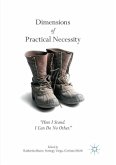We are often pressed to forgive or in need of forgiveness: Wrongdoing is common. Even after a perpetrator has been taken to court and punished, forgiveness still has a role to play. How should a victim and a perpetrator relate to each other outside the courtroom, and how should others relate to them? Communicating about forgiveness is particularly urgent in cases of civil war and crimes against humanity inside a community where, if there were no forgiveness, the community would fall apart. Forgiveness is governed by social and, in particular, by moral norms. Do those who ask to be forgiven have to fulfil certain conditions for being granted forgiveness? And what does the granting of forgiveness consist in? We may feel like refusing to forgive those perpetrators who have committed the most horrendous crimes. But is such a refusal justified even if they repent their crimes? Could there be a duty for the victim to forgive? Can forgiveness be granted by a third party? Under which conditions may we forgive ourselves? The papers collected in the present volume address all these questions, exploring the practice of forgiveness and its normative constraints. Topics include the ancient Chinese and the Christian traditions of forgiveness, the impact of forgiveness on the moral dignity and self-respect of the victim, self-forgiveness, the narrative of forgiveness as well as the limits of forgiveness. Such limits may arise from the personal, historical, or political conditions of wrongdoing or from the emotional constraints of the victims.
Hinweis: Dieser Artikel kann nur an eine deutsche Lieferadresse ausgeliefert werden.
Hinweis: Dieser Artikel kann nur an eine deutsche Lieferadresse ausgeliefert werden.








